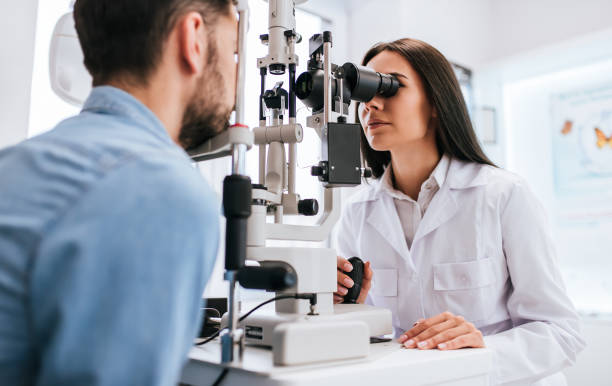Madhan Kumar . Follow
1 month ago
Our eyes are among the most sensitive and important organs, playing a crucial role in our daily lives by allowing us to navigate the world. While many people are familiar with eye doctors like optometrists and ophthalmologists, fewer know about retina specialists. A retina specialist is a medical doctor (ophthalmologist) who has undergone advanced training in the diagnosis and treatment of retinal disorders, which are often complex and require specialized care.
In this article, we'll explore what a retina specialist does, common retina conditions, treatment options, and when you should consider seeing one. We'll also cover cluster topics such as macular degeneration, diabetic retinopathy, retinal detachment, and the importance of early diagnosis.

What is a Retina Specialist?
A retina specialist is an ophthalmologist who has completed additional fellowship training in diseases and surgery of the retina and vitreous. The retina is the thin layer of tissue at the back of the eye responsible for receiving and processing light signals, enabling us to see. Damage to the retina can result in vision loss or blindness, making it essential to consult a specialist for retina-related problems.
Retina specialists use advanced diagnostic tools, such as optical coherence tomography (OCT) and fluorescein angiography, to diagnose and treat a range of retinal conditions. Their expertise includes both medical and surgical treatments of the retina.
Common Conditions Treated by Retina Specialists
1. Macular Degeneration
Age-related macular degeneration (AMD) is a leading cause of vision loss, particularly in older adults. It affects the macula, the central part of the retina, which is responsible for detailed central vision. There are two types of AMD: dry and wet. Dry AMD is the more common and progresses slowly, while wet AMD is less common but can cause rapid and severe vision loss due to abnormal blood vessel growth beneath the retina.
Retina specialists manage AMD by using anti-VEGF injections to reduce abnormal blood vessel growth in wet AMD and prescribing nutritional supplements to slow down dry AMD progression.
2. Diabetic Retinopathy
Diabetic retinopathy is a complication of diabetes that affects the blood vessels in the retina. High blood sugar levels can cause these vessels to swell, leak, or grow abnormally, potentially leading to vision impairment or blindness.
There are two stages of diabetic retinopathy: non-proliferative (early stage) and proliferative (advanced stage). Retina specialists treat diabetic retinopathy using laser surgery, anti-VEGF injections, or vitrectomy (removal of the vitreous gel from the eye) in severe cases. Early detection is crucial, as treatment can prevent severe vision loss.
3. Retinal Detachment
Retinal detachment occurs when the retina separates from the underlying tissue, leading to an emergency situation that requires immediate attention. Symptoms include flashes of light, floaters, and a shadow or curtain over part of your visual field.
Retina specialists treat retinal detachment through surgical procedures, such as pneumatic retinopexy, scleral buckle surgery, or vitrectomy, depending on the severity and type of detachment.
Symptoms of Retinal Diseases: When to See a Retina Specialist
It’s essential to recognize the symptoms of retinal diseases early to prevent further damage. Some common symptoms include:
- Sudden or gradual loss of vision
- Distorted or blurred vision
- Dark spots or shadows in your vision (floaters)
- Flashes of light in your field of vision
- Difficulty seeing in dim lighting or at night
- A gradual narrowing of your field of vision (tunnel vision)
If you experience any of these symptoms, consult an eye care professional immediately. Optometrists and general ophthalmologists can refer you to a retina specialist if they suspect a retinal condition.
Diagnostic Tools Used by Retina Specialists
Retina specialists rely on various advanced diagnostic tools to assess the health of the retina and surrounding structures. Some of the most common diagnostic tools include:
- Optical Coherence Tomography (OCT): A non-invasive imaging test that produces high-resolution cross-sectional images of the retina, allowing specialists to assess its layers and detect abnormalities.
- Fluorescein Angiography: This test uses a dye injected into the bloodstream to highlight the blood vessels in the retina. It is commonly used to detect conditions like diabetic retinopathy and wet macular degeneration.
- Fundus Photography: A retinal camera is used to capture detailed images of the retina, helping specialists track changes over time.
These tools provide retina specialists with detailed information necessary for accurate diagnosis and treatment planning.
Treatment Options Provided by Retina Specialists
1. Anti-VEGF Injections
One of the most common treatments for conditions like wet AMD and diabetic retinopathy is anti-VEGF injections. These injections inhibit the growth of abnormal blood vessels and reduce fluid leakage in the retina, helping to stabilize or improve vision.
2. Laser Therapy
Laser treatment can be used for conditions such as diabetic retinopathy, retinal tears, and sometimes retinal detachment. Laser photocoagulation seals leaking blood vessels and prevents further vision loss.
3. Vitrectomy
Vitrectomy is a surgical procedure where the vitreous gel is removed from the eye to allow for the retina to be treated more effectively. This surgery is often used for retinal detachment, macular holes, and advanced diabetic retinopathy.
4. Retinal Surgery
Retina specialists also perform surgical interventions for more severe retinal conditions, such as retinal detachments, macular puckers, and epiretinal membranes. The goal is to reattach the retina or remove scar tissue that might be causing vision problems.
The Importance of Early Diagnosis and Regular Eye Exams
Many retinal diseases, like AMD and diabetic retinopathy, are progressive, meaning they worsen over time if left untreated. Early detection is key to preventing severe vision loss. Regular eye exams can detect early signs of these conditions, especially in individuals at higher risk, such as those with diabetes, high blood pressure, or a family history of retinal diseases.
It is important to visit a retina specialist for a thorough evaluation if you experience any unusual changes in your vision, particularly if you are at risk of retinal conditions. Specialized care can help preserve your vision and improve your quality of life.
Conclusion
A retina specialist plays a vital role in maintaining and preserving eye health, particularly for those at risk of or suffering from retinal conditions. With advancements in diagnostic tools and treatment options, patients now have a greater chance of maintaining good vision even when faced with potentially serious retinal diseases. Regular eye exams, early diagnosis, and timely treatment by a retina specialist are crucial steps in safeguarding your vision for the future.




